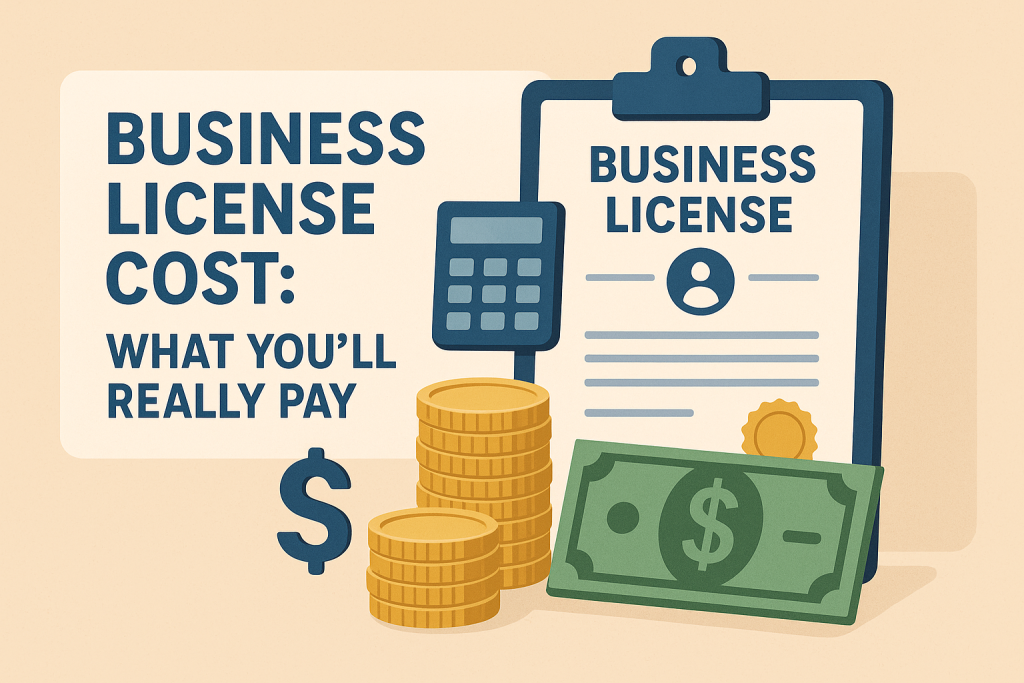Starting a company brings excitement—and expenses. One critical step is securing proper authorization to operate legally. While fees vary nationwide, knowing what to expect helps avoid surprises and keeps your venture compliant.
Authorization expenses depend on your industry, location, and regulatory needs. A home bakery might pay under $100, while a medical practice could spend thousands. Local governments set unique rules, so costs shift between cities and states. For example, California’s base fees often exceed Wyoming’s.
Many entrepreneurs overlook renewal charges and add-ons like health permits or zoning approvals. These hidden fees stack up quickly. A food truck owner might budget $300 for initial licensing but need $150 annually for inspections.
Research matters. Phoenix charges different rates than Tucson for similar ventures. Checking county websites or consulting local agencies clarifies requirements. Some industries face extra hoops—contractors often need bonding or specialized certifications.
Smart planning turns licensing from a headache into an advantage. Proper documentation builds trust with banks and clients. It also prevents fines that could derail your progress. Allocate funds early, and you’ll start operations smoothly.
Key Takeaways
- Authorization fees range from under $50 to thousands based on industry and location
- Local governments set unique requirements for cities, counties, and states
- Renewal fees and specialized permits often increase total costs over time
- Proper licensing prevents legal issues and builds credibility with partners
- Research local regulations thoroughly during early budgeting stages
Overview of Business Licensing in the United States
Legal authorization stands as a cornerstone for operational legitimacy. Across all 50 states, companies must obtain official approval to conduct activities. Local governments often layer additional rules beyond state mandates.
Understanding What a Business License Is
These documents act as government-issued green lights. They confirm your operations meet safety protocols and tax obligations. Most fall into two categories:
| Type | Purpose | Examples |
|---|---|---|
| General | Basic operational approval | Retail stores, consulting firms |
| Specialized | Activity-specific compliance | Food trucks, medical practices |
Contractors might need bonding certificates alongside standard permits. Health service providers frequently require multiple approvals.
The Importance of Licensing for Your Business
Proper authorization builds instant credibility. Banks review these documents during loan applications. Clients check them before signing contracts.
Three key benefits emerge:
- Avoids shutdowns from non-compliance fines
- Strengthens partnerships through verified legitimacy
- Ensures public safety through regulated standards
Seattle restaurant owners pay 37% more for permits than Spokane businesses. This variation highlights why localized research matters. Always verify county-level rules before finalizing budgets.
Factors That Affect Business License Costs
Multiple elements determine what you’ll pay for operational permits. These variables create cost differences between a hair salon in Miami and a tech startup in Austin. Let’s break down the main influencers. Enhancing your visibility on social platforms starts with this step-by-step guide on how to properly add your business location to Instagram.
Industry, Location, and Regulatory Requirements
Your field dictates permit complexity. Medical offices face stricter rules than online retailers. States also set unique standards—California charges $50-$100 for basic authorization, while Arkansas ranges from $50 to $1,000+.
| State | Typical Cost Range | Special Requirements |
|---|---|---|
| Maryland | $5 – $500 | Zoning approvals for physical locations |
| Texas | $75 – $2,500 | Environmental permits for manufacturing |
| Florida | $30 – $800 | Tourist tax for hospitality ventures |
Geographic factors matter too. Coastal cities often add stormwater fees. Mountain towns might require wildlife impact studies. Always check county websites for hidden rules.
Additional Fees and Renewal Charges
Initial permits are just the start. Many forget recurring costs:
- Annual renewals (1-5 year cycles)
- Inspection fees for food or childcare services
- Late penalties for missed deadlines
A Maryland consulting firm might pay $150 upfront but $75 yearly. Multi-state operations face layered fees—each jurisdiction adds its own rate. Plan for these during budgeting to avoid cash flow surprises.
How Much is a Business License? Cost Breakdown & Examples
Location dictates more than real estate prices—it shapes your operational expenses from day one. Authorization requirements swing wildly between regions, with urban hubs demanding deeper investments than rural towns.
Geographic Cost Variations
State governments set baseline rates, but cities layer additional charges. Check these common examples:
| Location | Cost Range | Notes |
|---|---|---|
| Nevada | $200-$500 | State-level general authorization |
| Chicago | $75-$6,000 | Varies by industry scale |
| New York City | $100-$200 | Base rate plus industry add-ons |
Washington charges a flat $90 statewide fee. New Mexico keeps costs low at $35 annually. Urban centers often multiply expenses: Minneapolis ranges from $15 to $10,000+ based on services offered.
Industry-Specific Pricing Models
Food trucks face different financial hurdles than consulting firms. Professional services require specialized certifications that retail stores avoid. Consider these contrasts:
- Boston charges $65 for basic certificates
- New Orleans starts occupational permits at $50
- Newark averages $150 for standard approvals
Bundled packages in some states save money for multi-service operations. Always compare single permits versus package deals during planning phases. Smart location choices balance market access with manageable compliance costs.
Navigating Licensing and Permit Requirements
Understanding where to obtain permits feels like solving a multi-layered puzzle. City and county regulations often differ dramatically from state-level rules, creating a patchwork of compliance needs.
State Versus Local Licensing Nuances
Five states—including Florida and Texas—don’t issue statewide operational permits. Entrepreneurs in these areas must secure approvals from each city or county where they operate. For example:
- Miami Beach restaurants need separate permits from Orlando food trucks
- Houston contractors face different bonding rules than Austin builders
- Charlotte retailers comply with distinct standards from Raleigh competitors
Local governments frequently add extra layers. A Georgia bakery might pay $50 for county authorization but $200 for city-specific health permits. Alabama’s Mobile County charges different fees than Birmingham for similar ventures.
Three strategies simplify compliance:
- Contact city clerks for current fee schedules
- Track renewal deadlines using digital calendars
- Consult attorneys for multi-location operations
Staying updated prevents costly mistakes. Phoenix revised its zoning permits twice last year, while Denver adjusted food service fees quarterly. Regular check-ins with local agencies keep your venture compliant as rules evolve.
Integrating Business Licensing with LLC Formation
Building a legally compliant venture requires synchronizing entity formation with operational permits. While establishing an LLC creates your company’s legal backbone, securing proper authorization ensures day-to-day activities meet local rules.
LLC Registration Fees and Operating Agreements
Georgia charges $225 to file LLC paperwork with the Secretary of State. Expedited processing cuts wait times to two business days for urgent needs. Though operating agreements aren’t mandatory here, they establish clear roles and profit-sharing terms.
Smart founders view these documents as operational insurance. They prevent ownership disputes and outline procedures for adding partners or dissolving the company.
Considerations for Foreign LLCs and Additional Permits
Expanding across state lines triggers foreign qualification requirements. Georgia demands $235 for out-of-state firms to operate locally. This includes a $10 service charge for paper filings.
Annual reports keep your LLC in good standing with a $50 fee plus potential processing charges. Budget for recurring compliance costs alongside initial registration expenses. Cross-check local permit needs—some cities require separate certificates even after state-level approvals.
Aligning entity formation with licensing creates a solid foundation. Track renewal dates and maintain organized records to streamline inspections or partnership talks. Proper planning turns bureaucratic steps into strategic advantages.







